Language Learning: Process and Personal Experience
VerifiedAdded on 2023/06/12
|11
|3424
|322
AI Summary
This essay discusses the process of learning of language of the individuals. It also talks about a personal context- my experience as a learner in the language classroom. This essay argues that social development plays an important role in the aspect of language acquisition of the children.
Contribute Materials
Your contribution can guide someone’s learning journey. Share your
documents today.
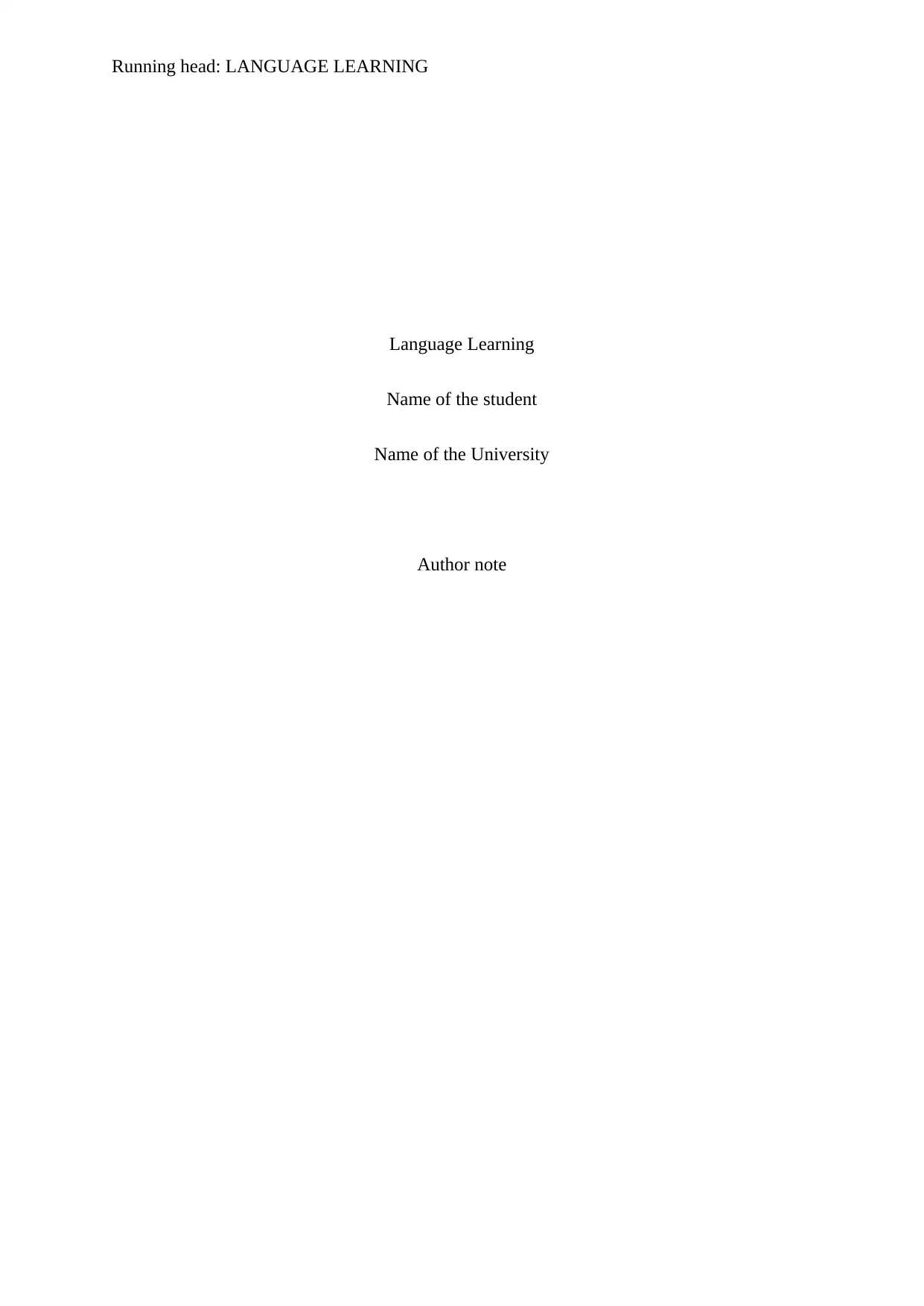
Running head: LANGUAGE LEARNING
Language Learning
Name of the student
Name of the University
Author note
Language Learning
Name of the student
Name of the University
Author note
Secure Best Marks with AI Grader
Need help grading? Try our AI Grader for instant feedback on your assignments.
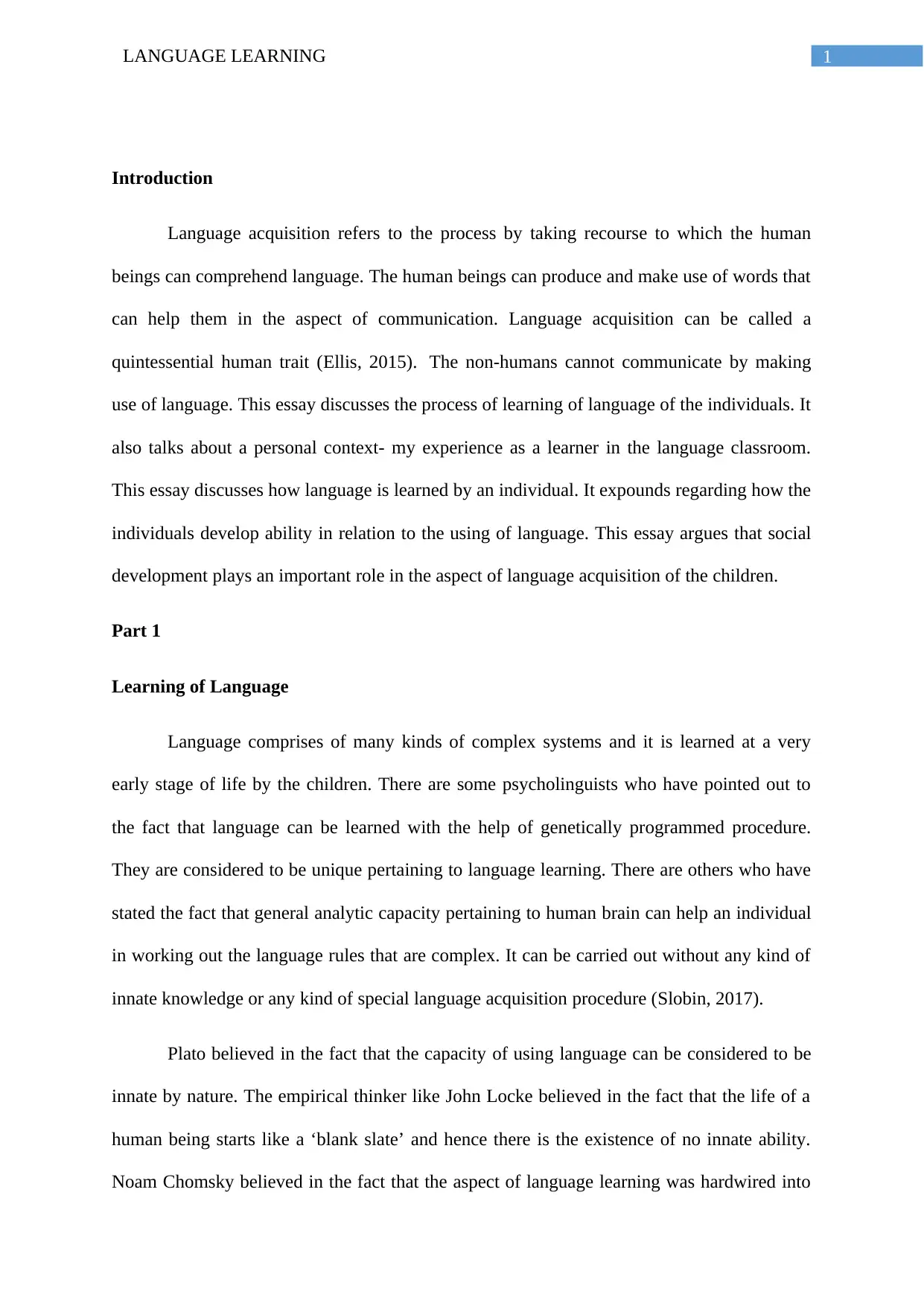
1LANGUAGE LEARNING
Introduction
Language acquisition refers to the process by taking recourse to which the human
beings can comprehend language. The human beings can produce and make use of words that
can help them in the aspect of communication. Language acquisition can be called a
quintessential human trait (Ellis, 2015). The non-humans cannot communicate by making
use of language. This essay discusses the process of learning of language of the individuals. It
also talks about a personal context- my experience as a learner in the language classroom.
This essay discusses how language is learned by an individual. It expounds regarding how the
individuals develop ability in relation to the using of language. This essay argues that social
development plays an important role in the aspect of language acquisition of the children.
Part 1
Learning of Language
Language comprises of many kinds of complex systems and it is learned at a very
early stage of life by the children. There are some psycholinguists who have pointed out to
the fact that language can be learned with the help of genetically programmed procedure.
They are considered to be unique pertaining to language learning. There are others who have
stated the fact that general analytic capacity pertaining to human brain can help an individual
in working out the language rules that are complex. It can be carried out without any kind of
innate knowledge or any kind of special language acquisition procedure (Slobin, 2017).
Plato believed in the fact that the capacity of using language can be considered to be
innate by nature. The empirical thinker like John Locke believed in the fact that the life of a
human being starts like a ‘blank slate’ and hence there is the existence of no innate ability.
Noam Chomsky believed in the fact that the aspect of language learning was hardwired into
Introduction
Language acquisition refers to the process by taking recourse to which the human
beings can comprehend language. The human beings can produce and make use of words that
can help them in the aspect of communication. Language acquisition can be called a
quintessential human trait (Ellis, 2015). The non-humans cannot communicate by making
use of language. This essay discusses the process of learning of language of the individuals. It
also talks about a personal context- my experience as a learner in the language classroom.
This essay discusses how language is learned by an individual. It expounds regarding how the
individuals develop ability in relation to the using of language. This essay argues that social
development plays an important role in the aspect of language acquisition of the children.
Part 1
Learning of Language
Language comprises of many kinds of complex systems and it is learned at a very
early stage of life by the children. There are some psycholinguists who have pointed out to
the fact that language can be learned with the help of genetically programmed procedure.
They are considered to be unique pertaining to language learning. There are others who have
stated the fact that general analytic capacity pertaining to human brain can help an individual
in working out the language rules that are complex. It can be carried out without any kind of
innate knowledge or any kind of special language acquisition procedure (Slobin, 2017).
Plato believed in the fact that the capacity of using language can be considered to be
innate by nature. The empirical thinker like John Locke believed in the fact that the life of a
human being starts like a ‘blank slate’ and hence there is the existence of no innate ability.
Noam Chomsky believed in the fact that the aspect of language learning was hardwired into
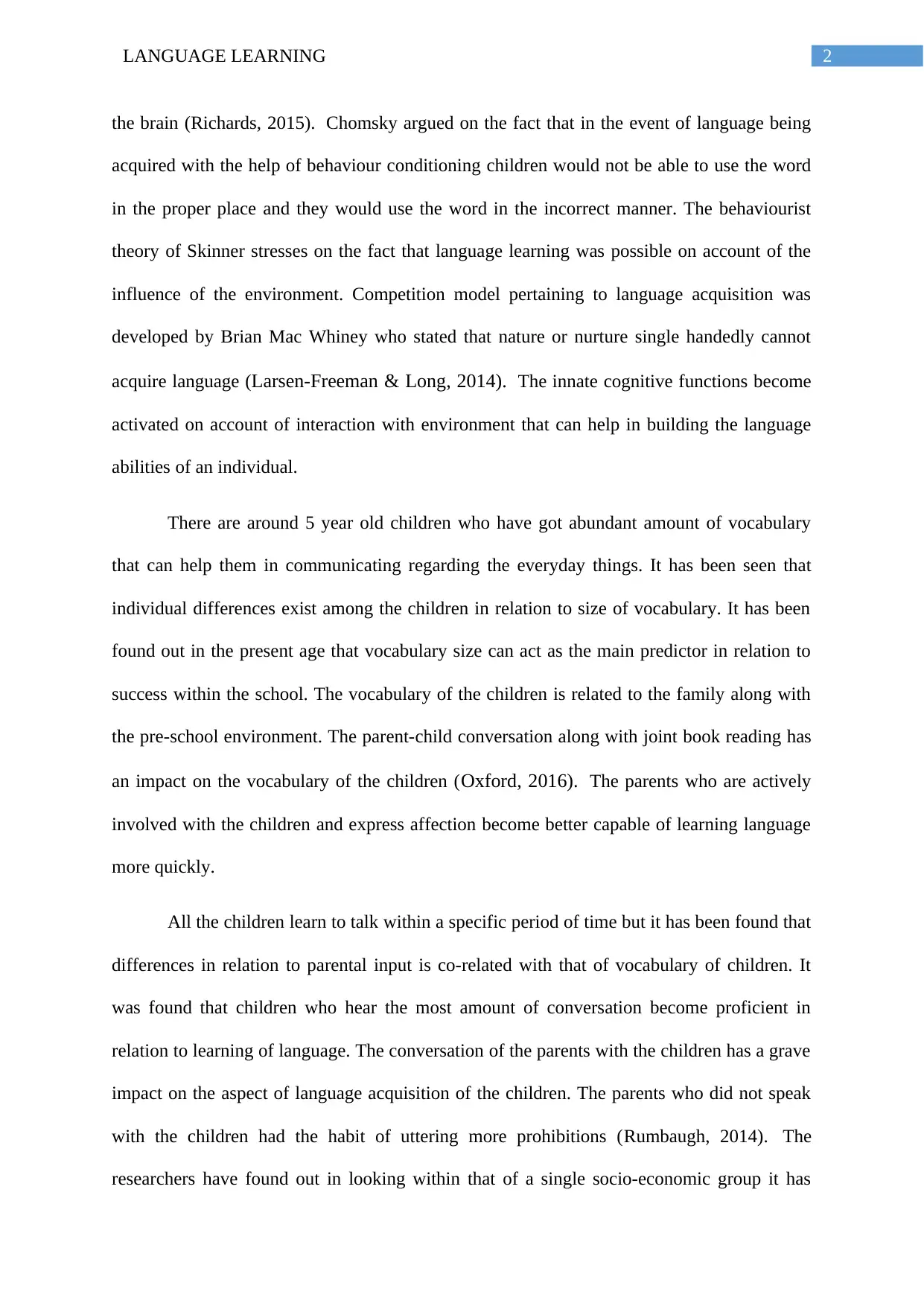
2LANGUAGE LEARNING
the brain (Richards, 2015). Chomsky argued on the fact that in the event of language being
acquired with the help of behaviour conditioning children would not be able to use the word
in the proper place and they would use the word in the incorrect manner. The behaviourist
theory of Skinner stresses on the fact that language learning was possible on account of the
influence of the environment. Competition model pertaining to language acquisition was
developed by Brian Mac Whiney who stated that nature or nurture single handedly cannot
acquire language (Larsen-Freeman & Long, 2014). The innate cognitive functions become
activated on account of interaction with environment that can help in building the language
abilities of an individual.
There are around 5 year old children who have got abundant amount of vocabulary
that can help them in communicating regarding the everyday things. It has been seen that
individual differences exist among the children in relation to size of vocabulary. It has been
found out in the present age that vocabulary size can act as the main predictor in relation to
success within the school. The vocabulary of the children is related to the family along with
the pre-school environment. The parent-child conversation along with joint book reading has
an impact on the vocabulary of the children (Oxford, 2016). The parents who are actively
involved with the children and express affection become better capable of learning language
more quickly.
All the children learn to talk within a specific period of time but it has been found that
differences in relation to parental input is co-related with that of vocabulary of children. It
was found that children who hear the most amount of conversation become proficient in
relation to learning of language. The conversation of the parents with the children has a grave
impact on the aspect of language acquisition of the children. The parents who did not speak
with the children had the habit of uttering more prohibitions (Rumbaugh, 2014). The
researchers have found out in looking within that of a single socio-economic group it has
the brain (Richards, 2015). Chomsky argued on the fact that in the event of language being
acquired with the help of behaviour conditioning children would not be able to use the word
in the proper place and they would use the word in the incorrect manner. The behaviourist
theory of Skinner stresses on the fact that language learning was possible on account of the
influence of the environment. Competition model pertaining to language acquisition was
developed by Brian Mac Whiney who stated that nature or nurture single handedly cannot
acquire language (Larsen-Freeman & Long, 2014). The innate cognitive functions become
activated on account of interaction with environment that can help in building the language
abilities of an individual.
There are around 5 year old children who have got abundant amount of vocabulary
that can help them in communicating regarding the everyday things. It has been seen that
individual differences exist among the children in relation to size of vocabulary. It has been
found out in the present age that vocabulary size can act as the main predictor in relation to
success within the school. The vocabulary of the children is related to the family along with
the pre-school environment. The parent-child conversation along with joint book reading has
an impact on the vocabulary of the children (Oxford, 2016). The parents who are actively
involved with the children and express affection become better capable of learning language
more quickly.
All the children learn to talk within a specific period of time but it has been found that
differences in relation to parental input is co-related with that of vocabulary of children. It
was found that children who hear the most amount of conversation become proficient in
relation to learning of language. The conversation of the parents with the children has a grave
impact on the aspect of language acquisition of the children. The parents who did not speak
with the children had the habit of uttering more prohibitions (Rumbaugh, 2014). The
researchers have found out in looking within that of a single socio-economic group it has
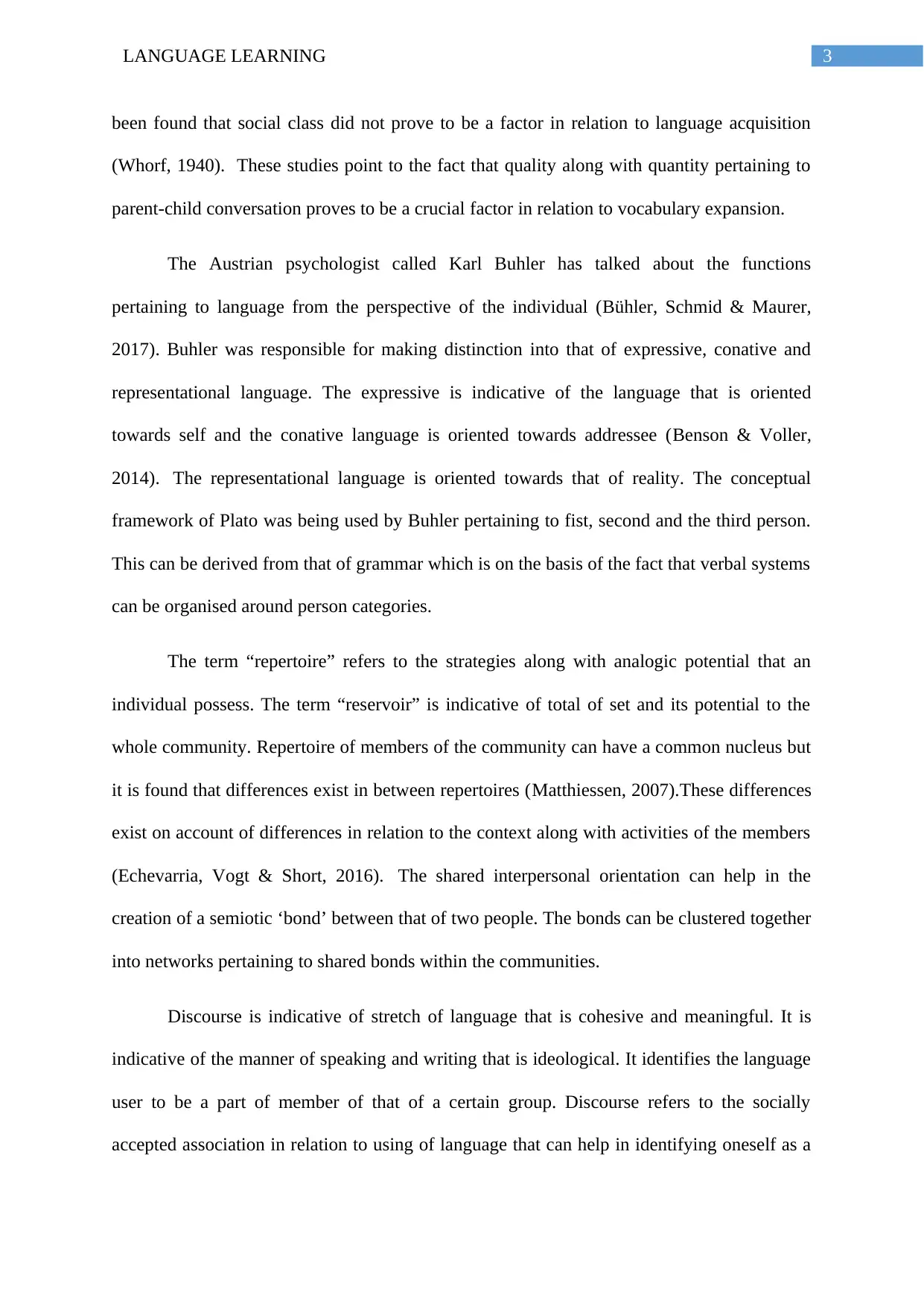
3LANGUAGE LEARNING
been found that social class did not prove to be a factor in relation to language acquisition
(Whorf, 1940). These studies point to the fact that quality along with quantity pertaining to
parent-child conversation proves to be a crucial factor in relation to vocabulary expansion.
The Austrian psychologist called Karl Buhler has talked about the functions
pertaining to language from the perspective of the individual (Bühler, Schmid & Maurer,
2017). Buhler was responsible for making distinction into that of expressive, conative and
representational language. The expressive is indicative of the language that is oriented
towards self and the conative language is oriented towards addressee (Benson & Voller,
2014). The representational language is oriented towards that of reality. The conceptual
framework of Plato was being used by Buhler pertaining to fist, second and the third person.
This can be derived from that of grammar which is on the basis of the fact that verbal systems
can be organised around person categories.
The term “repertoire” refers to the strategies along with analogic potential that an
individual possess. The term “reservoir” is indicative of total of set and its potential to the
whole community. Repertoire of members of the community can have a common nucleus but
it is found that differences exist in between repertoires (Matthiessen, 2007).These differences
exist on account of differences in relation to the context along with activities of the members
(Echevarria, Vogt & Short, 2016). The shared interpersonal orientation can help in the
creation of a semiotic ‘bond’ between that of two people. The bonds can be clustered together
into networks pertaining to shared bonds within the communities.
Discourse is indicative of stretch of language that is cohesive and meaningful. It is
indicative of the manner of speaking and writing that is ideological. It identifies the language
user to be a part of member of that of a certain group. Discourse refers to the socially
accepted association in relation to using of language that can help in identifying oneself as a
been found that social class did not prove to be a factor in relation to language acquisition
(Whorf, 1940). These studies point to the fact that quality along with quantity pertaining to
parent-child conversation proves to be a crucial factor in relation to vocabulary expansion.
The Austrian psychologist called Karl Buhler has talked about the functions
pertaining to language from the perspective of the individual (Bühler, Schmid & Maurer,
2017). Buhler was responsible for making distinction into that of expressive, conative and
representational language. The expressive is indicative of the language that is oriented
towards self and the conative language is oriented towards addressee (Benson & Voller,
2014). The representational language is oriented towards that of reality. The conceptual
framework of Plato was being used by Buhler pertaining to fist, second and the third person.
This can be derived from that of grammar which is on the basis of the fact that verbal systems
can be organised around person categories.
The term “repertoire” refers to the strategies along with analogic potential that an
individual possess. The term “reservoir” is indicative of total of set and its potential to the
whole community. Repertoire of members of the community can have a common nucleus but
it is found that differences exist in between repertoires (Matthiessen, 2007).These differences
exist on account of differences in relation to the context along with activities of the members
(Echevarria, Vogt & Short, 2016). The shared interpersonal orientation can help in the
creation of a semiotic ‘bond’ between that of two people. The bonds can be clustered together
into networks pertaining to shared bonds within the communities.
Discourse is indicative of stretch of language that is cohesive and meaningful. It is
indicative of the manner of speaking and writing that is ideological. It identifies the language
user to be a part of member of that of a certain group. Discourse refers to the socially
accepted association in relation to using of language that can help in identifying oneself as a
Secure Best Marks with AI Grader
Need help grading? Try our AI Grader for instant feedback on your assignments.
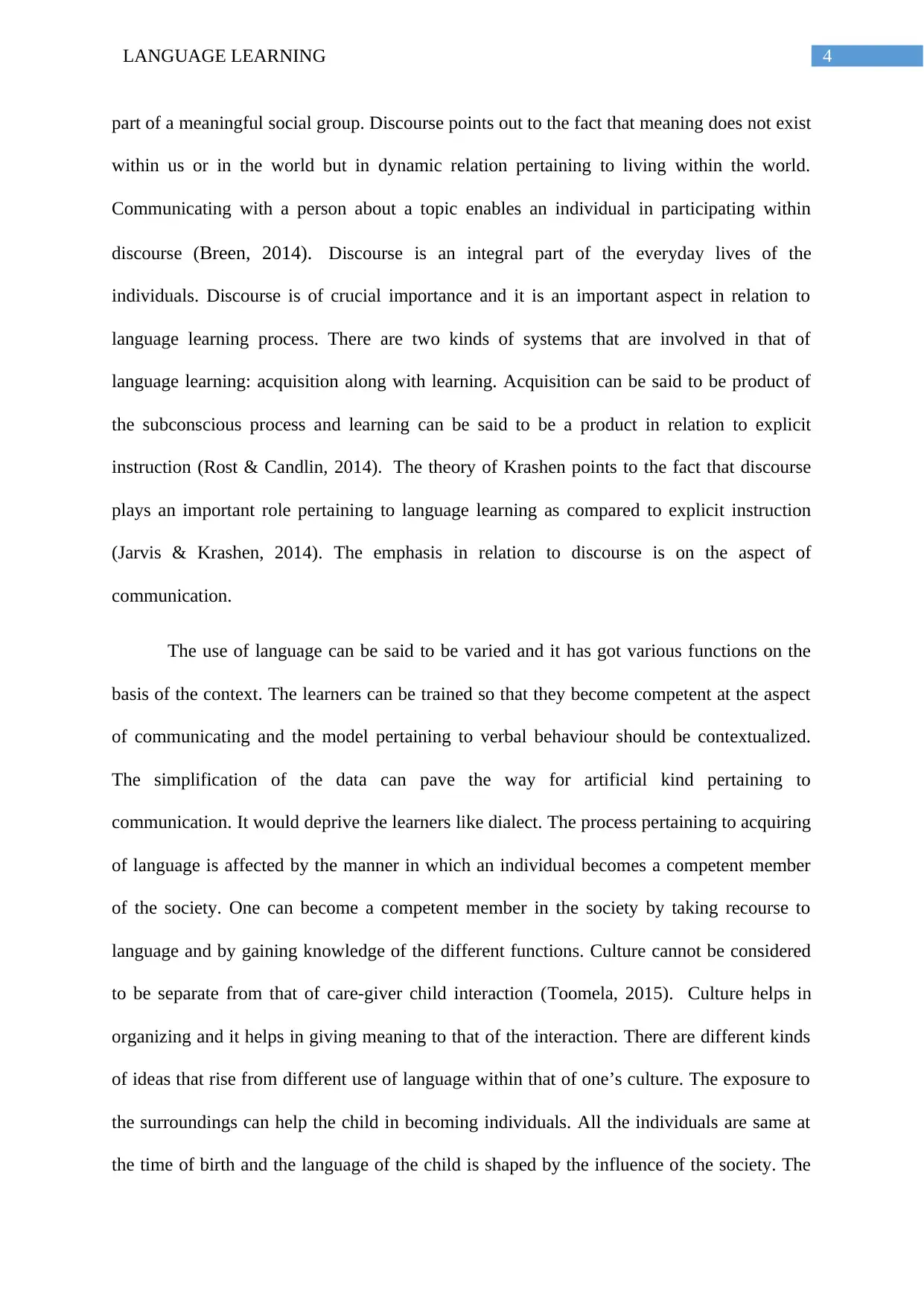
4LANGUAGE LEARNING
part of a meaningful social group. Discourse points out to the fact that meaning does not exist
within us or in the world but in dynamic relation pertaining to living within the world.
Communicating with a person about a topic enables an individual in participating within
discourse (Breen, 2014). Discourse is an integral part of the everyday lives of the
individuals. Discourse is of crucial importance and it is an important aspect in relation to
language learning process. There are two kinds of systems that are involved in that of
language learning: acquisition along with learning. Acquisition can be said to be product of
the subconscious process and learning can be said to be a product in relation to explicit
instruction (Rost & Candlin, 2014). The theory of Krashen points to the fact that discourse
plays an important role pertaining to language learning as compared to explicit instruction
(Jarvis & Krashen, 2014). The emphasis in relation to discourse is on the aspect of
communication.
The use of language can be said to be varied and it has got various functions on the
basis of the context. The learners can be trained so that they become competent at the aspect
of communicating and the model pertaining to verbal behaviour should be contextualized.
The simplification of the data can pave the way for artificial kind pertaining to
communication. It would deprive the learners like dialect. The process pertaining to acquiring
of language is affected by the manner in which an individual becomes a competent member
of the society. One can become a competent member in the society by taking recourse to
language and by gaining knowledge of the different functions. Culture cannot be considered
to be separate from that of care-giver child interaction (Toomela, 2015). Culture helps in
organizing and it helps in giving meaning to that of the interaction. There are different kinds
of ideas that rise from different use of language within that of one’s culture. The exposure to
the surroundings can help the child in becoming individuals. All the individuals are same at
the time of birth and the language of the child is shaped by the influence of the society. The
part of a meaningful social group. Discourse points out to the fact that meaning does not exist
within us or in the world but in dynamic relation pertaining to living within the world.
Communicating with a person about a topic enables an individual in participating within
discourse (Breen, 2014). Discourse is an integral part of the everyday lives of the
individuals. Discourse is of crucial importance and it is an important aspect in relation to
language learning process. There are two kinds of systems that are involved in that of
language learning: acquisition along with learning. Acquisition can be said to be product of
the subconscious process and learning can be said to be a product in relation to explicit
instruction (Rost & Candlin, 2014). The theory of Krashen points to the fact that discourse
plays an important role pertaining to language learning as compared to explicit instruction
(Jarvis & Krashen, 2014). The emphasis in relation to discourse is on the aspect of
communication.
The use of language can be said to be varied and it has got various functions on the
basis of the context. The learners can be trained so that they become competent at the aspect
of communicating and the model pertaining to verbal behaviour should be contextualized.
The simplification of the data can pave the way for artificial kind pertaining to
communication. It would deprive the learners like dialect. The process pertaining to acquiring
of language is affected by the manner in which an individual becomes a competent member
of the society. One can become a competent member in the society by taking recourse to
language and by gaining knowledge of the different functions. Culture cannot be considered
to be separate from that of care-giver child interaction (Toomela, 2015). Culture helps in
organizing and it helps in giving meaning to that of the interaction. There are different kinds
of ideas that rise from different use of language within that of one’s culture. The exposure to
the surroundings can help the child in becoming individuals. All the individuals are same at
the time of birth and the language of the child is shaped by the influence of the society. The
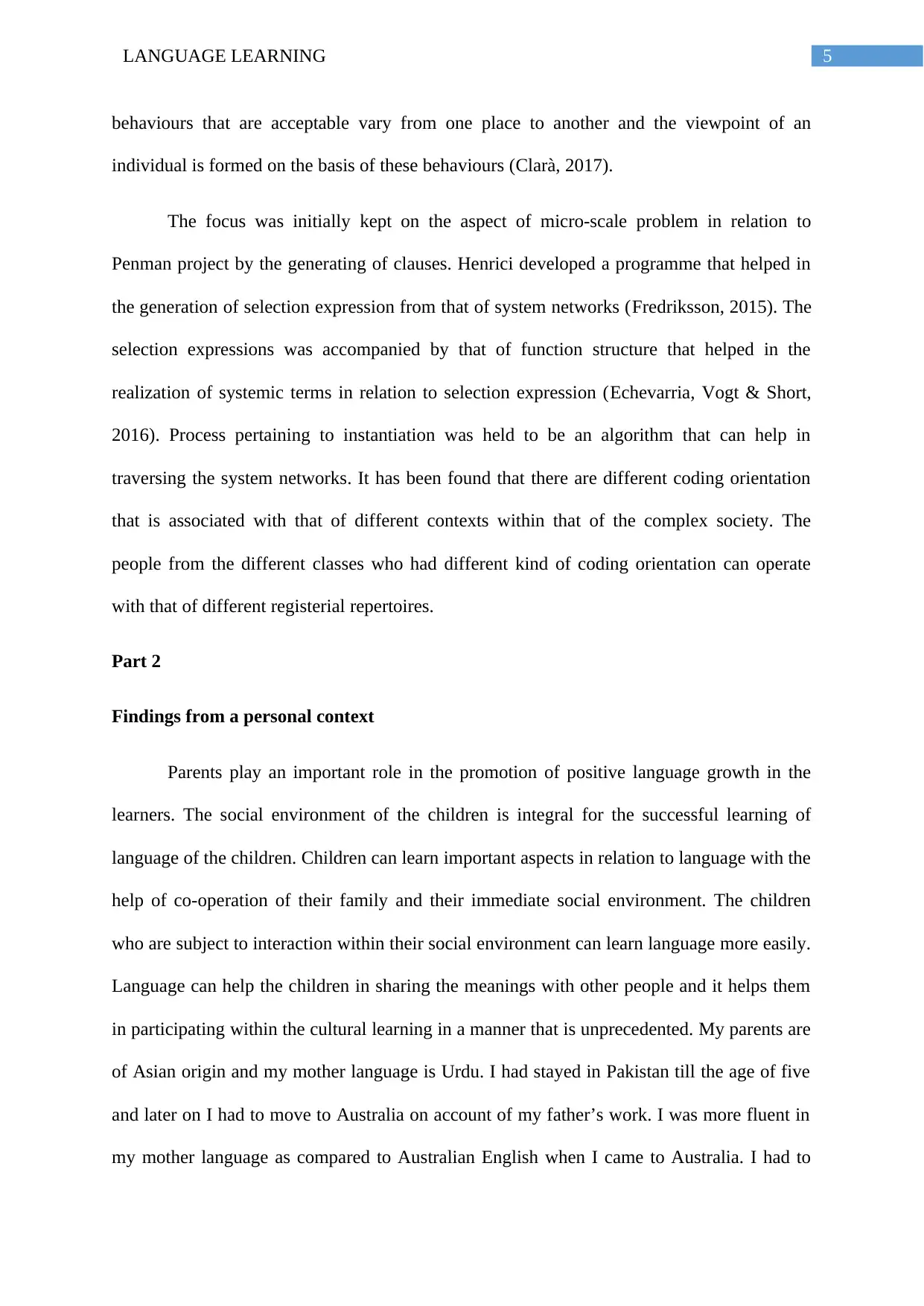
5LANGUAGE LEARNING
behaviours that are acceptable vary from one place to another and the viewpoint of an
individual is formed on the basis of these behaviours (Clarà, 2017).
The focus was initially kept on the aspect of micro-scale problem in relation to
Penman project by the generating of clauses. Henrici developed a programme that helped in
the generation of selection expression from that of system networks (Fredriksson, 2015). The
selection expressions was accompanied by that of function structure that helped in the
realization of systemic terms in relation to selection expression (Echevarria, Vogt & Short,
2016). Process pertaining to instantiation was held to be an algorithm that can help in
traversing the system networks. It has been found that there are different coding orientation
that is associated with that of different contexts within that of the complex society. The
people from the different classes who had different kind of coding orientation can operate
with that of different registerial repertoires.
Part 2
Findings from a personal context
Parents play an important role in the promotion of positive language growth in the
learners. The social environment of the children is integral for the successful learning of
language of the children. Children can learn important aspects in relation to language with the
help of co-operation of their family and their immediate social environment. The children
who are subject to interaction within their social environment can learn language more easily.
Language can help the children in sharing the meanings with other people and it helps them
in participating within the cultural learning in a manner that is unprecedented. My parents are
of Asian origin and my mother language is Urdu. I had stayed in Pakistan till the age of five
and later on I had to move to Australia on account of my father’s work. I was more fluent in
my mother language as compared to Australian English when I came to Australia. I had to
behaviours that are acceptable vary from one place to another and the viewpoint of an
individual is formed on the basis of these behaviours (Clarà, 2017).
The focus was initially kept on the aspect of micro-scale problem in relation to
Penman project by the generating of clauses. Henrici developed a programme that helped in
the generation of selection expression from that of system networks (Fredriksson, 2015). The
selection expressions was accompanied by that of function structure that helped in the
realization of systemic terms in relation to selection expression (Echevarria, Vogt & Short,
2016). Process pertaining to instantiation was held to be an algorithm that can help in
traversing the system networks. It has been found that there are different coding orientation
that is associated with that of different contexts within that of the complex society. The
people from the different classes who had different kind of coding orientation can operate
with that of different registerial repertoires.
Part 2
Findings from a personal context
Parents play an important role in the promotion of positive language growth in the
learners. The social environment of the children is integral for the successful learning of
language of the children. Children can learn important aspects in relation to language with the
help of co-operation of their family and their immediate social environment. The children
who are subject to interaction within their social environment can learn language more easily.
Language can help the children in sharing the meanings with other people and it helps them
in participating within the cultural learning in a manner that is unprecedented. My parents are
of Asian origin and my mother language is Urdu. I had stayed in Pakistan till the age of five
and later on I had to move to Australia on account of my father’s work. I was more fluent in
my mother language as compared to Australian English when I came to Australia. I had to
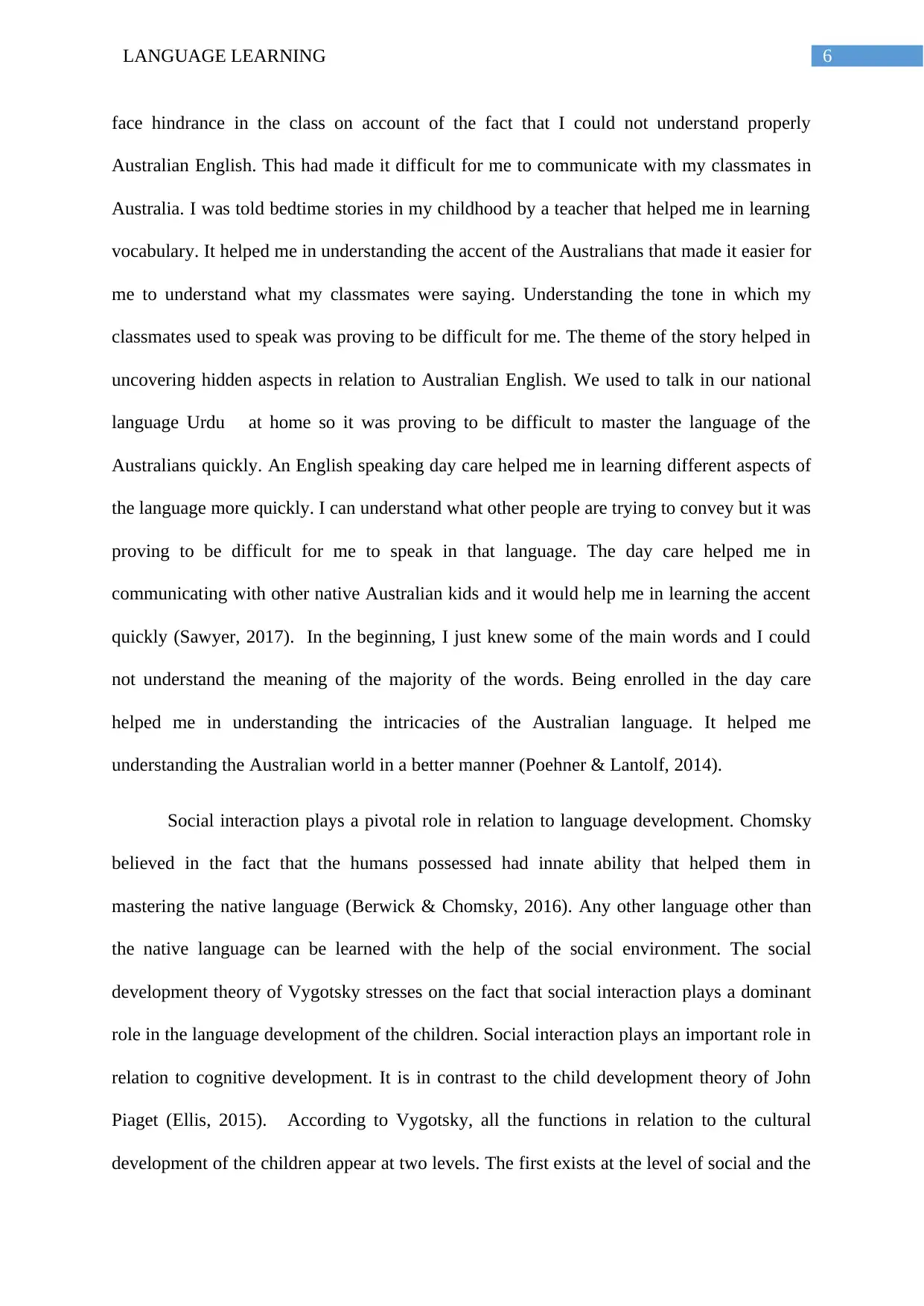
6LANGUAGE LEARNING
face hindrance in the class on account of the fact that I could not understand properly
Australian English. This had made it difficult for me to communicate with my classmates in
Australia. I was told bedtime stories in my childhood by a teacher that helped me in learning
vocabulary. It helped me in understanding the accent of the Australians that made it easier for
me to understand what my classmates were saying. Understanding the tone in which my
classmates used to speak was proving to be difficult for me. The theme of the story helped in
uncovering hidden aspects in relation to Australian English. We used to talk in our national
language Urdu at home so it was proving to be difficult to master the language of the
Australians quickly. An English speaking day care helped me in learning different aspects of
the language more quickly. I can understand what other people are trying to convey but it was
proving to be difficult for me to speak in that language. The day care helped me in
communicating with other native Australian kids and it would help me in learning the accent
quickly (Sawyer, 2017). In the beginning, I just knew some of the main words and I could
not understand the meaning of the majority of the words. Being enrolled in the day care
helped me in understanding the intricacies of the Australian language. It helped me
understanding the Australian world in a better manner (Poehner & Lantolf, 2014).
Social interaction plays a pivotal role in relation to language development. Chomsky
believed in the fact that the humans possessed had innate ability that helped them in
mastering the native language (Berwick & Chomsky, 2016). Any other language other than
the native language can be learned with the help of the social environment. The social
development theory of Vygotsky stresses on the fact that social interaction plays a dominant
role in the language development of the children. Social interaction plays an important role in
relation to cognitive development. It is in contrast to the child development theory of John
Piaget (Ellis, 2015). According to Vygotsky, all the functions in relation to the cultural
development of the children appear at two levels. The first exists at the level of social and the
face hindrance in the class on account of the fact that I could not understand properly
Australian English. This had made it difficult for me to communicate with my classmates in
Australia. I was told bedtime stories in my childhood by a teacher that helped me in learning
vocabulary. It helped me in understanding the accent of the Australians that made it easier for
me to understand what my classmates were saying. Understanding the tone in which my
classmates used to speak was proving to be difficult for me. The theme of the story helped in
uncovering hidden aspects in relation to Australian English. We used to talk in our national
language Urdu at home so it was proving to be difficult to master the language of the
Australians quickly. An English speaking day care helped me in learning different aspects of
the language more quickly. I can understand what other people are trying to convey but it was
proving to be difficult for me to speak in that language. The day care helped me in
communicating with other native Australian kids and it would help me in learning the accent
quickly (Sawyer, 2017). In the beginning, I just knew some of the main words and I could
not understand the meaning of the majority of the words. Being enrolled in the day care
helped me in understanding the intricacies of the Australian language. It helped me
understanding the Australian world in a better manner (Poehner & Lantolf, 2014).
Social interaction plays a pivotal role in relation to language development. Chomsky
believed in the fact that the humans possessed had innate ability that helped them in
mastering the native language (Berwick & Chomsky, 2016). Any other language other than
the native language can be learned with the help of the social environment. The social
development theory of Vygotsky stresses on the fact that social interaction plays a dominant
role in the language development of the children. Social interaction plays an important role in
relation to cognitive development. It is in contrast to the child development theory of John
Piaget (Ellis, 2015). According to Vygotsky, all the functions in relation to the cultural
development of the children appear at two levels. The first exists at the level of social and the
Paraphrase This Document
Need a fresh take? Get an instant paraphrase of this document with our AI Paraphraser
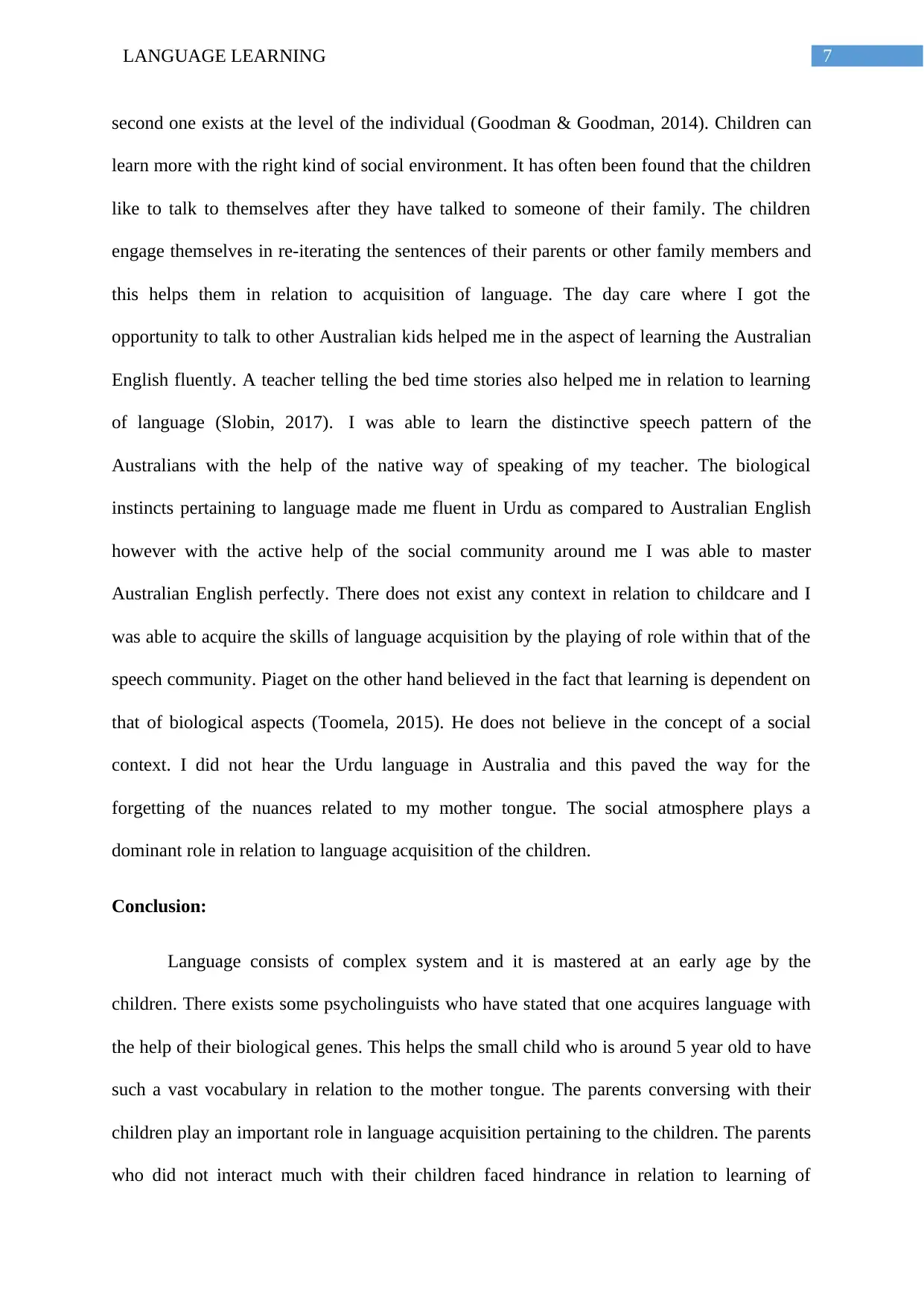
7LANGUAGE LEARNING
second one exists at the level of the individual (Goodman & Goodman, 2014). Children can
learn more with the right kind of social environment. It has often been found that the children
like to talk to themselves after they have talked to someone of their family. The children
engage themselves in re-iterating the sentences of their parents or other family members and
this helps them in relation to acquisition of language. The day care where I got the
opportunity to talk to other Australian kids helped me in the aspect of learning the Australian
English fluently. A teacher telling the bed time stories also helped me in relation to learning
of language (Slobin, 2017). I was able to learn the distinctive speech pattern of the
Australians with the help of the native way of speaking of my teacher. The biological
instincts pertaining to language made me fluent in Urdu as compared to Australian English
however with the active help of the social community around me I was able to master
Australian English perfectly. There does not exist any context in relation to childcare and I
was able to acquire the skills of language acquisition by the playing of role within that of the
speech community. Piaget on the other hand believed in the fact that learning is dependent on
that of biological aspects (Toomela, 2015). He does not believe in the concept of a social
context. I did not hear the Urdu language in Australia and this paved the way for the
forgetting of the nuances related to my mother tongue. The social atmosphere plays a
dominant role in relation to language acquisition of the children.
Conclusion:
Language consists of complex system and it is mastered at an early age by the
children. There exists some psycholinguists who have stated that one acquires language with
the help of their biological genes. This helps the small child who is around 5 year old to have
such a vast vocabulary in relation to the mother tongue. The parents conversing with their
children play an important role in language acquisition pertaining to the children. The parents
who did not interact much with their children faced hindrance in relation to learning of
second one exists at the level of the individual (Goodman & Goodman, 2014). Children can
learn more with the right kind of social environment. It has often been found that the children
like to talk to themselves after they have talked to someone of their family. The children
engage themselves in re-iterating the sentences of their parents or other family members and
this helps them in relation to acquisition of language. The day care where I got the
opportunity to talk to other Australian kids helped me in the aspect of learning the Australian
English fluently. A teacher telling the bed time stories also helped me in relation to learning
of language (Slobin, 2017). I was able to learn the distinctive speech pattern of the
Australians with the help of the native way of speaking of my teacher. The biological
instincts pertaining to language made me fluent in Urdu as compared to Australian English
however with the active help of the social community around me I was able to master
Australian English perfectly. There does not exist any context in relation to childcare and I
was able to acquire the skills of language acquisition by the playing of role within that of the
speech community. Piaget on the other hand believed in the fact that learning is dependent on
that of biological aspects (Toomela, 2015). He does not believe in the concept of a social
context. I did not hear the Urdu language in Australia and this paved the way for the
forgetting of the nuances related to my mother tongue. The social atmosphere plays a
dominant role in relation to language acquisition of the children.
Conclusion:
Language consists of complex system and it is mastered at an early age by the
children. There exists some psycholinguists who have stated that one acquires language with
the help of their biological genes. This helps the small child who is around 5 year old to have
such a vast vocabulary in relation to the mother tongue. The parents conversing with their
children play an important role in language acquisition pertaining to the children. The parents
who did not interact much with their children faced hindrance in relation to learning of
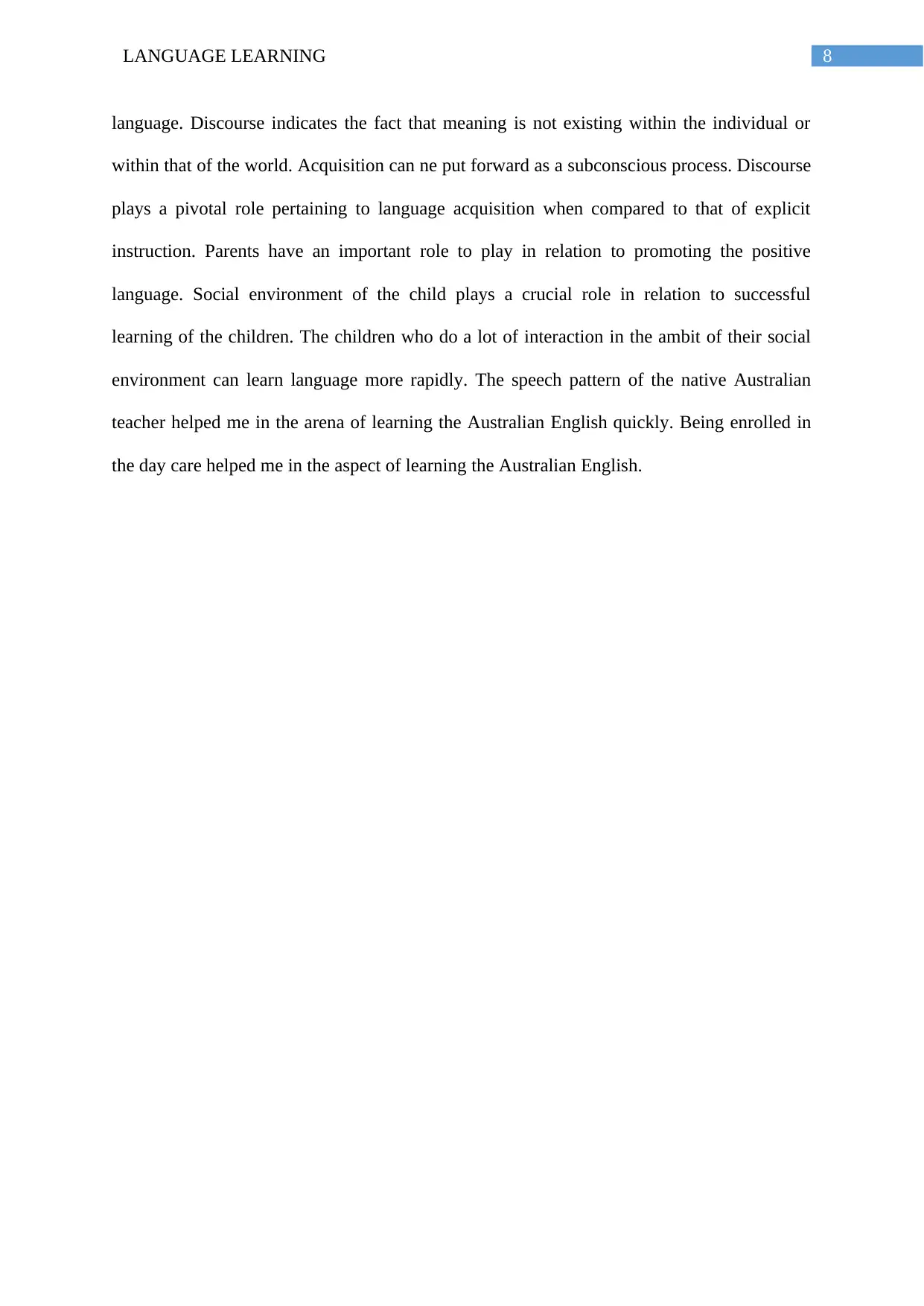
8LANGUAGE LEARNING
language. Discourse indicates the fact that meaning is not existing within the individual or
within that of the world. Acquisition can ne put forward as a subconscious process. Discourse
plays a pivotal role pertaining to language acquisition when compared to that of explicit
instruction. Parents have an important role to play in relation to promoting the positive
language. Social environment of the child plays a crucial role in relation to successful
learning of the children. The children who do a lot of interaction in the ambit of their social
environment can learn language more rapidly. The speech pattern of the native Australian
teacher helped me in the arena of learning the Australian English quickly. Being enrolled in
the day care helped me in the aspect of learning the Australian English.
language. Discourse indicates the fact that meaning is not existing within the individual or
within that of the world. Acquisition can ne put forward as a subconscious process. Discourse
plays a pivotal role pertaining to language acquisition when compared to that of explicit
instruction. Parents have an important role to play in relation to promoting the positive
language. Social environment of the child plays a crucial role in relation to successful
learning of the children. The children who do a lot of interaction in the ambit of their social
environment can learn language more rapidly. The speech pattern of the native Australian
teacher helped me in the arena of learning the Australian English quickly. Being enrolled in
the day care helped me in the aspect of learning the Australian English.
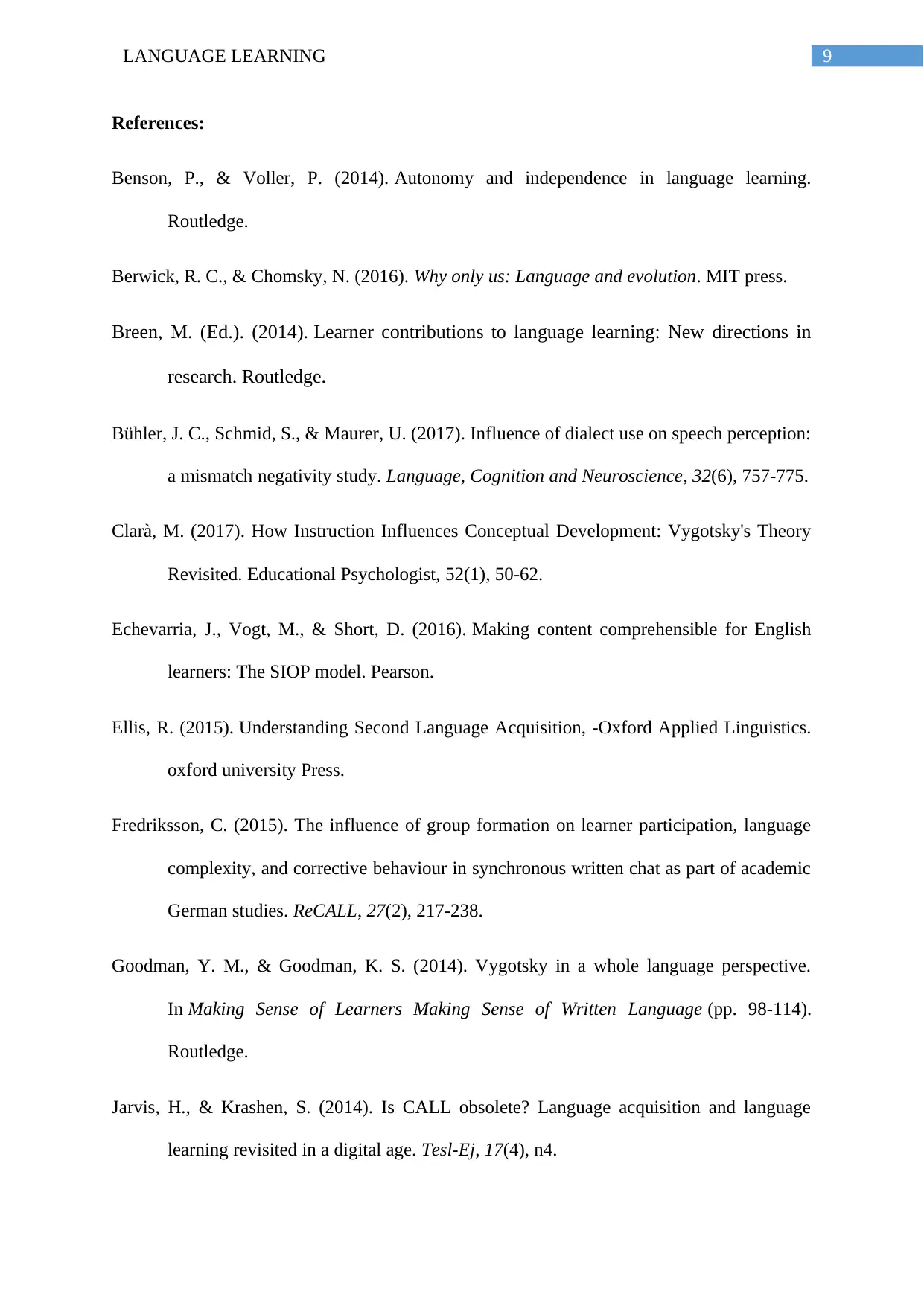
9LANGUAGE LEARNING
References:
Benson, P., & Voller, P. (2014). Autonomy and independence in language learning.
Routledge.
Berwick, R. C., & Chomsky, N. (2016). Why only us: Language and evolution. MIT press.
Breen, M. (Ed.). (2014). Learner contributions to language learning: New directions in
research. Routledge.
Bühler, J. C., Schmid, S., & Maurer, U. (2017). Influence of dialect use on speech perception:
a mismatch negativity study. Language, Cognition and Neuroscience, 32(6), 757-775.
Clarà, M. (2017). How Instruction Influences Conceptual Development: Vygotsky's Theory
Revisited. Educational Psychologist, 52(1), 50-62.
Echevarria, J., Vogt, M., & Short, D. (2016). Making content comprehensible for English
learners: The SIOP model. Pearson.
Ellis, R. (2015). Understanding Second Language Acquisition, -Oxford Applied Linguistics.
oxford university Press.
Fredriksson, C. (2015). The influence of group formation on learner participation, language
complexity, and corrective behaviour in synchronous written chat as part of academic
German studies. ReCALL, 27(2), 217-238.
Goodman, Y. M., & Goodman, K. S. (2014). Vygotsky in a whole language perspective.
In Making Sense of Learners Making Sense of Written Language (pp. 98-114).
Routledge.
Jarvis, H., & Krashen, S. (2014). Is CALL obsolete? Language acquisition and language
learning revisited in a digital age. Tesl-Ej, 17(4), n4.
References:
Benson, P., & Voller, P. (2014). Autonomy and independence in language learning.
Routledge.
Berwick, R. C., & Chomsky, N. (2016). Why only us: Language and evolution. MIT press.
Breen, M. (Ed.). (2014). Learner contributions to language learning: New directions in
research. Routledge.
Bühler, J. C., Schmid, S., & Maurer, U. (2017). Influence of dialect use on speech perception:
a mismatch negativity study. Language, Cognition and Neuroscience, 32(6), 757-775.
Clarà, M. (2017). How Instruction Influences Conceptual Development: Vygotsky's Theory
Revisited. Educational Psychologist, 52(1), 50-62.
Echevarria, J., Vogt, M., & Short, D. (2016). Making content comprehensible for English
learners: The SIOP model. Pearson.
Ellis, R. (2015). Understanding Second Language Acquisition, -Oxford Applied Linguistics.
oxford university Press.
Fredriksson, C. (2015). The influence of group formation on learner participation, language
complexity, and corrective behaviour in synchronous written chat as part of academic
German studies. ReCALL, 27(2), 217-238.
Goodman, Y. M., & Goodman, K. S. (2014). Vygotsky in a whole language perspective.
In Making Sense of Learners Making Sense of Written Language (pp. 98-114).
Routledge.
Jarvis, H., & Krashen, S. (2014). Is CALL obsolete? Language acquisition and language
learning revisited in a digital age. Tesl-Ej, 17(4), n4.
Secure Best Marks with AI Grader
Need help grading? Try our AI Grader for instant feedback on your assignments.
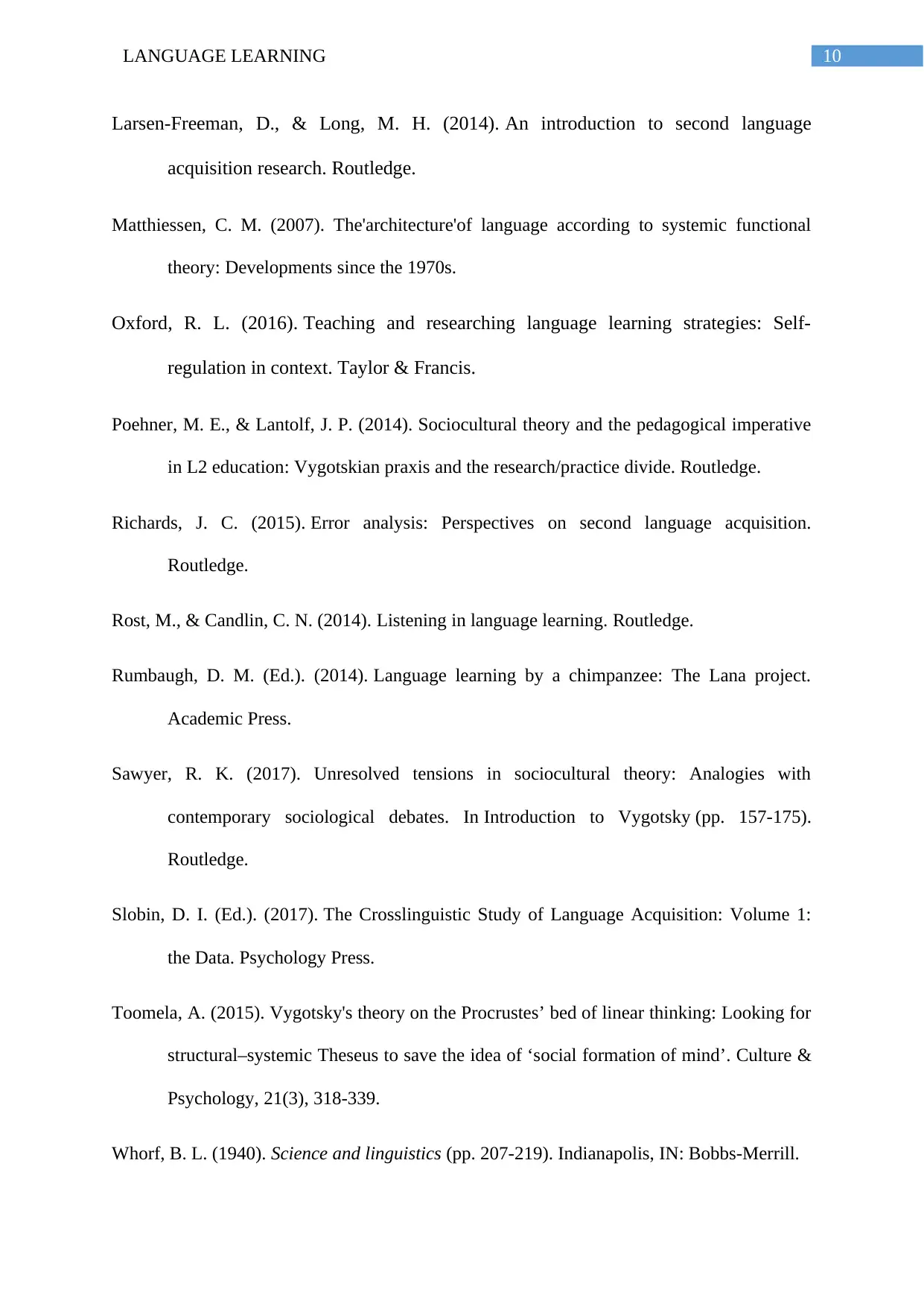
10LANGUAGE LEARNING
Larsen-Freeman, D., & Long, M. H. (2014). An introduction to second language
acquisition research. Routledge.
Matthiessen, C. M. (2007). The'architecture'of language according to systemic functional
theory: Developments since the 1970s.
Oxford, R. L. (2016). Teaching and researching language learning strategies: Self-
regulation in context. Taylor & Francis.
Poehner, M. E., & Lantolf, J. P. (2014). Sociocultural theory and the pedagogical imperative
in L2 education: Vygotskian praxis and the research/practice divide. Routledge.
Richards, J. C. (2015). Error analysis: Perspectives on second language acquisition.
Routledge.
Rost, M., & Candlin, C. N. (2014). Listening in language learning. Routledge.
Rumbaugh, D. M. (Ed.). (2014). Language learning by a chimpanzee: The Lana project.
Academic Press.
Sawyer, R. K. (2017). Unresolved tensions in sociocultural theory: Analogies with
contemporary sociological debates. In Introduction to Vygotsky (pp. 157-175).
Routledge.
Slobin, D. I. (Ed.). (2017). The Crosslinguistic Study of Language Acquisition: Volume 1:
the Data. Psychology Press.
Toomela, A. (2015). Vygotsky's theory on the Procrustes’ bed of linear thinking: Looking for
structural–systemic Theseus to save the idea of ‘social formation of mind’. Culture &
Psychology, 21(3), 318-339.
Whorf, B. L. (1940). Science and linguistics (pp. 207-219). Indianapolis, IN: Bobbs-Merrill.
Larsen-Freeman, D., & Long, M. H. (2014). An introduction to second language
acquisition research. Routledge.
Matthiessen, C. M. (2007). The'architecture'of language according to systemic functional
theory: Developments since the 1970s.
Oxford, R. L. (2016). Teaching and researching language learning strategies: Self-
regulation in context. Taylor & Francis.
Poehner, M. E., & Lantolf, J. P. (2014). Sociocultural theory and the pedagogical imperative
in L2 education: Vygotskian praxis and the research/practice divide. Routledge.
Richards, J. C. (2015). Error analysis: Perspectives on second language acquisition.
Routledge.
Rost, M., & Candlin, C. N. (2014). Listening in language learning. Routledge.
Rumbaugh, D. M. (Ed.). (2014). Language learning by a chimpanzee: The Lana project.
Academic Press.
Sawyer, R. K. (2017). Unresolved tensions in sociocultural theory: Analogies with
contemporary sociological debates. In Introduction to Vygotsky (pp. 157-175).
Routledge.
Slobin, D. I. (Ed.). (2017). The Crosslinguistic Study of Language Acquisition: Volume 1:
the Data. Psychology Press.
Toomela, A. (2015). Vygotsky's theory on the Procrustes’ bed of linear thinking: Looking for
structural–systemic Theseus to save the idea of ‘social formation of mind’. Culture &
Psychology, 21(3), 318-339.
Whorf, B. L. (1940). Science and linguistics (pp. 207-219). Indianapolis, IN: Bobbs-Merrill.
1 out of 11
Related Documents
Your All-in-One AI-Powered Toolkit for Academic Success.
+13062052269
info@desklib.com
Available 24*7 on WhatsApp / Email
![[object Object]](/_next/static/media/star-bottom.7253800d.svg)
Unlock your academic potential
© 2024 | Zucol Services PVT LTD | All rights reserved.





